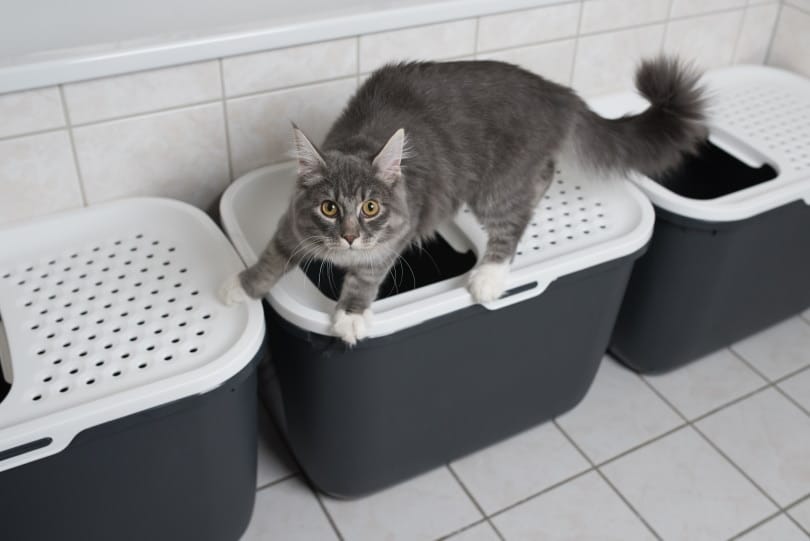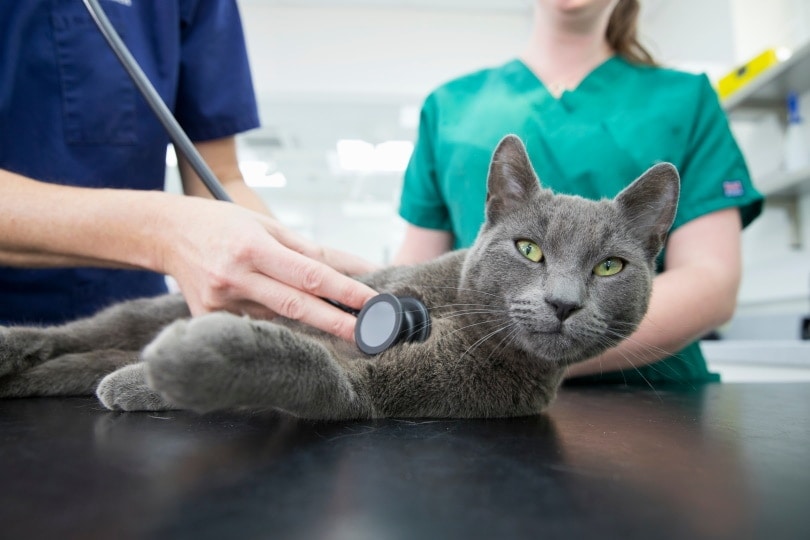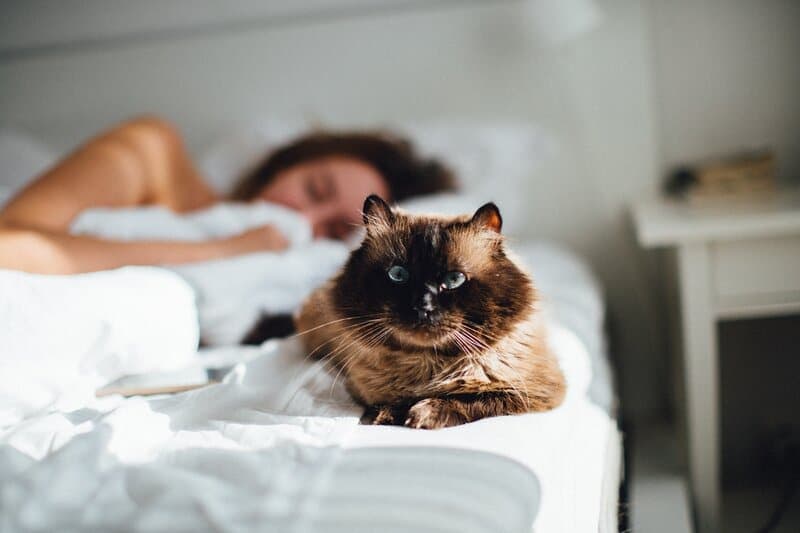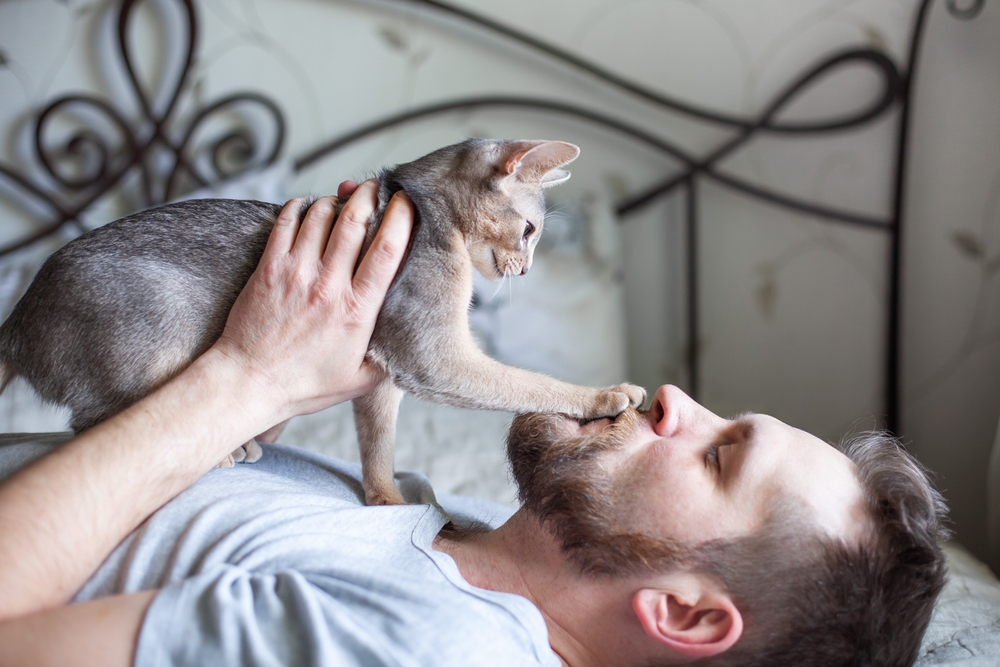Are you Googling question this while you’re washing your sheets? If your cat surprised you during your peaceful slumber with their potent urine, you want answers! After all, you’ll want to ensure the situation doesn’t repeat itself. So naturally, you want to get to the underlying cause.
While not all feline behaviors are predictable, there are certain things to make it more understandable for us humans. The first thing you should do is to visit your veterinarian to rule out urgent medical problems. If your cat has relieved themselves on you or your bed, here are five reasons it could’ve happened and tips on ensuring it doesn’t happen again!

The 5 Reasons Why Your Cat Peed on You While You Were Sleeping
1. Your Cat Has Underlying Health Issues
First and foremost, if your cat suddenly pees on your bed, with no known cause, it’s best to look at their health. Specific health issues can make it very hard for your cat to hold their bladder.
Typically, underlying health issues are accompanied by behavioral or physical changes.
Here are a few health issues that could result in going to the bathroom outside of the litter box:
- Urinary problems
- Arthritis
- Problems that cause your cat to drink more, like diabetes or kidney problems
- Weakness
Typically, a physical exam done by your vet, along with urine and blood samples, can rule out most minor and major issues. Usually, a fix can be as simple as some medication, but it will depend on the diagnosis (if there is one).
2. Your Cat Is Dealing With Environmental Stress
Environmental stress can trigger many different behaviors that are completely out of the blue. Whether you brought home a new baby or a new pet or recently moved, these changes can throw your cat off-balance.
Even something minimal can sometimes trigger different behaviors in your pets. If your cat is feeling off, they might end up peeing in your bed, on you, or on other items in your home.
Consider this. If you have a new dog with free reign of the household, your cat might be afraid to leave your room at night to go to their litter box. Instead of risking the trip for fear of running into the dog, your cat simply pees on you while sleeping.
It’s not the most favorable thing for them, but it is a way to relieve themselves while remaining in a safe position. If environmental stress is the trigger, most of these situations self-resolve after your cat acclimates to their new surroundings.
However, sometimes, you must make big changes around the household to stop the behavior. After all, the last thing you want to do is wash your sheets every day and invest in a mattress cover to protect your items.

3. Your Cat Is Marking or Spraying
Is your cat fixed? If not, take note of how old they are. After roughly 5 to 6 months, your cat reaches sexual maturity. At this point, they will start to change their behavior and begin seeking a mate. You might notice that when a female is in heat, they become extremely lovable, even overbearing. Males are more testy than usual and even display certain signs of aggression.
On top of these behavioral changes between boys and girls, both genders can mark their territory. If they consider your bed their territory, they might just decide to spray on you while you’re sleeping.
This isn’t a common phenomenon, but it can happen. Not only can your cat spray due to hormones, they can also spray due to stress and other factors in the home.
After realizing this information, you might wonder how you tell the difference between urinating and spraying. That’s a great question! Marking is usually vertical, meaning they spray upright over a vertical surface. Spraying tends to smell much stronger than regular urine.
So, what exactly do you do in the scenario? Getting your cat fixed is the first thing you should do. Even though it doesn’t guarantee they won’t spray afterward, it can be a really beneficial thing to try for numerous reasons.
If you've got a cat, you know that even the tidiest of felines still leaves you cleaning up vomit, hair, smells, stains, and more. The Hepper Advanced Bio-Enzyme Pet Stain & Odor Eliminator Spray is the best addition to your kitty clean-up routine. Click here to learn more about this amazing product (and how it removes even the very worst smells and stains).
- ADVANCED ENZYMATIC CLEANER - Penetrates the most stubborn smells and stains at the deepest molecular...
- FOR ANY MESS, ON ANY SURFACE - This pet odor eliminator cleans your carpets, floors, furniture,...
- FRESH, NATURAL ODOR - Our unique formulation doesn't rely on dangerous or unpleasant chemical...
At Catster, we’ve admired Hepper for many years, and decided to take a controlling ownership interest so that we could benefit from the outstanding products of this cool cat company!
4. Your Cat Doesn’t Like Litter Box Changes
Litter boxes are critical in homes. If your cat is entirely comfortable with their litter box, they should never have much of an issue using it. However, certain factors make litter boxes undesirable for cats.
For example, if you’ve recently bought a litter box with or without a cover, it might change the atmosphere and make them less likely to use it. Typically, most cats can get used to changes with a litter box, but it might be a little difficult for them at first.
Or, maybe you’ve recently moved the box, causing confusion. If your cat is having trouble locating a litter box, they might decide to soil your sheets instead. If you think it’s a litter box, location, or change issue, limiting their space for a while until they get used to it might be for the best.
At night, when the lights are out, you can keep your cat in one room where their litter box is located. This will eliminate the risk of accidents happening throughout the home, localizing them to the area.

5. Your Cat Is Protesting Their Litter
Did you recently buy new litter? If so, your cat might not enjoy the texture, smell, or overall experience of using it. Rather than being able to explain this, they might take to other behaviors, like urinating outside of their litter box.
Your bed might just be the target for something that’s already a problem. Keep an eye on where else they’re urinating. Chances are, if it’s the litter, they’re not just going to the bathroom on your bed.
They might be going to various places throughout your home to compensate for their lack of bathroom space. You can always switch the litter back or find another option to see if it eliminates the behavior.

When to See a Vet
Whenever your cat changes their urinating pattern, it is time to make an appointment with your veterinarian. This way, they can give your cat a general look and run a few simple tests to rule out any big scary health issues that could be present.
As we mentioned earlier, it could stem from something as simple as an infection or as severe as organ failure. It’s important to note any other signs you see so you can discuss them with your vet at the time of your appointment.

Consulting Behavior Specialists
Don’t punish your cat for peeing on your bed. Is it annoying and completely inconvenient? Absolutely! But unfortunately, your cat is not going to understand why they’re being punished if you choose to take your anger out on them.
Instead, devise other ways to eliminate that behavior once any potential health issue is ruled out. If you still can’t get to the bottom of this behavior and it keeps repeating, you should contact a feline behavioral specialist.
They can give you tips and tricks to train your cat appropriately. If you need to figure out who to contact, you can always ask your veterinarian, local rescue, or shelter for recommendations.
Don’t be afraid to exhaust all of your resources. You can even find free online resources or videos that can help you with tips and tricks to try at home. It’s definitely better than giving up on your cat prematurely over a temporary behavior.

Conclusion
So, even though your cat urinating on you while you’re sleeping isn’t a pleasant thing to wake up to, you can decipher the behavior. It’s always best to take them to your vet to rule out any major health issues that could be affecting them.
Once you do that, you can look at other areas that might be the cause. Just be patient and make a vet appointment—just in case!
Featured Image Credit By: Adam Kuylenstierna, Unsplash
Contents
- The 5 Reasons Why Your Cat Peed on You While You Were Sleeping
- 1. Your Cat Has Underlying Health Issues
- 2. Your Cat Is Dealing With Environmental Stress
- 3. Your Cat Is Marking or Spraying
- 4. Your Cat Doesn’t Like Litter Box Changes
- 5. Your Cat Is Protesting Their Litter
- When to See a Vet
- Consulting Behavior Specialists
- Conclusion











